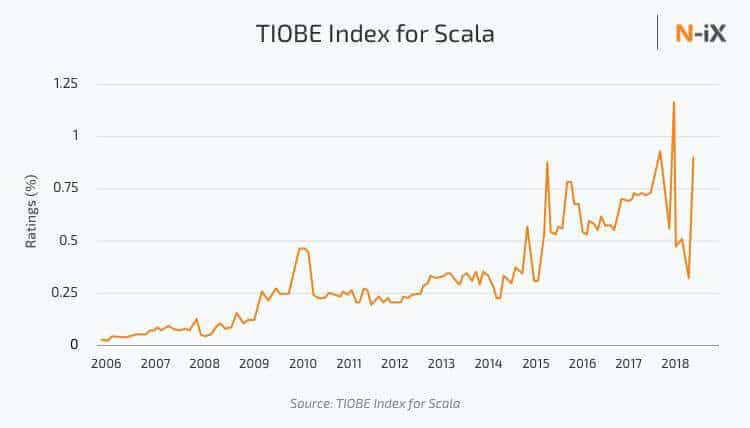Contents
The programming language name “Scala” represents scalability, and that’s exactly why Martin Odersky developed and released it back in 2014: to ensure that its features are scalable, just like Java and many other modern languages of the 21st century.
Scala has pretty much all the same features as we see in Java, but the besmachiet part is that it also covers some of the most criticized points of the older language. We also see great interoperability of both of these languages, which are driven by many similar features.

Just like its predecessor, Scala is also a general-purpose language, hence it can be used for both functional and object-oriented programming.
Java byte code is used as a compiler for Scala code, and it is executable on JVM. Also, the majority of Java libraries can also be used in Scala due to their similar language natures.
What Is Scala Programming Used for?
Scala is a fairly diverse language due to its interoperability with Java. Here are a few of its more noteworthy applications:
1. Machine Learning
The majority of the popular languages support machine learning in one way or the other. Similarly, Scala also carries the potential for writing machine algorithms, but the language comes with fewer utilities if we compare it to other leading languages of this industry, such as Python and R.
However, it is still strongly typed with compilation features, which is obviously a plus point for large projects. A range of frameworks, such as Spark and OpenNLP, are available for machine learning purposes.
Nevertheless, if you are more interested in this domain, then start your journey with these useful machine learning courses.
2. Web Application Development
Scala is a bit underrated in this domain, but it carries a lot of potential in web application development due to its object-oriented and functional programming concepts.
It allows developers to create their own data types, which is a plus point for web back-end development. However, many popular languages such as JavaScript and Python are still dominating this domain.
There are also a few Scala frameworks dedicated to web development, including the Play and Spring frameworks. However, we can also embed Java libraries into this programming language, which gives developers an edge to work with a bit more flexibility.
If you are looking forward to entering this humongous industry, then here are a few impressive web application development courses to help you along the way.
3. Deep Learning
Many languages are competing in this domain with their own set of advantages and disadvantages. Python is dominant in this area but it also lacks in some really solid neural network libraries.
That’s exactly where Scala jumps in, but there remain other deep learning languages that still beat it in many aspects.
Neural Networks have become demanding, and they are very data-hungry as they need a ton of computational resources. Scala manages and controls this data-hunger to ensure the correct use of resources in big data systems.
It smoothly handles tensor operations and neural networks used in deep learning. Furthermore, it is statically typed, which means errors will be sifted out during the compiling process. If your aim is to jump into neural networks and the like, then choose some deep learning courses to start now.
4. Game Development
Scala is not very dominant in this space, but the language still utilizes the Java frameworks such as Slick2D and LWJGL for game development processes. However, these frameworks do not support Scala’s latest features, as they are derived from Java.
There are numerous game development languages like Python, C++, and C# which are excessively used in popular gaming engines, but if we have a closer look at some of the Scala frameworks, then Sgine, Simplex3D and Scage can get the job done.
If we go a step further for the updated libraries and frameworks, then this awesome Scala GameDev list will aid developers a lot. If you are interested in learning more, then check out these best game development courses to start your career.
Why Should You Learn Scala?

There are multiple reasons to learn this language, especially if you are already familiar with Java, as those who are tend to learn it quickly.
1. Scala Is Multi-paradigm
Many languages stick to a specific paradigm, and it limits your opportunities. However, Scala is a general-purpose language with the interactive features of object-oriented and functional programming.
Hence, it gives you an opportunity to shift between paradigms such as:
- imperative
- functional
- logical
- OOP
2. Interoperability with Java
You can use Java libraries in this language as well; how cool is that? Moreover, they work hand-in-hand to bring you the best of both worlds. That’s why Scala code runs on JVM, and also, code convertibility is possible between both languages.
3. It Is Statically Typed
Statically typed languages are less prone to errors, while dynamically typed languages like Python are more prone to bugs. Glady, Scala is statically typed, which makes it a better choice in multiple domains.
4. Many Frameworks Being Introduced
Scala is a bit on the side of modern programming languages; hence, many of its frameworks are still in the development stage, while some amazing frameworks like Spark, Akka, and Play are already out and being used by developers.
If you want to get into these frameworks, then take your first step by choosing one of our favorite Scala courses.
5. Scala Is Very Expressive
Unlike Java, Scala is much more expressive in terms of its code and organization. Developers need to write fewer lines of code in order to accomplish a bigger task. This expressiveness has attracted many new developers who are just starting out.
6. Relatively Simpler Syntax
The OOP functionality and flexibility make Scala easier to learn and apply. Moreover, the language has clean syntax with very organized libraries, one of its most positive points.
Conclusion
Scala currently ranks #26 on the programming language list of Tiobe Index. However, there are many developers who learn Scala along with Java to cover the critical points and weaknesses of the latter.
At the end of the day, Scala itself carries potential, and its interoperability with Java makes it a worthwhile language to learn.